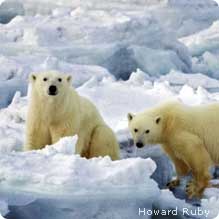Global warming is the single biggest threat to wildlife.
Effects on Wildlife and Habitat

Our country is home to a diverse array of wildlife ranging from the highest peaks, to the driest deserts, to freshwater and marine environments and to all the places in between. The abundant and diverse wildlife resources, which are so important to our culture and well-being, face a bleak future if we do not address global warming.
Wildlife depends on healthy habitats. They need:
- the right temperatures
- fresh water
- food sources
- places to raise their young
Climate change is altering key habitat elements that are critical to wildlife's survival and putting natural resources in jeopardy.
TEMPERATURE
- Melting arctic ice removes hunting ground from Polar Bears.
- Warmer water temperatures will cause population declines for trout, salmon and many other species that require cold water to survive.
- Rising ocean temperatures have already caused massive coral bleaching, leading to the collapse of these ecosystems which sustain huge numbers of fish.
WATER
- Larger floods are expected to increase erosion levels, reducing water quality and degrading aquatic habitat.
- Severe droughts stress and can kill plants on which wildlife depend for food and shelter, and deprives wildlife of water sources.
FOOD
- Climate change has altered food availability for migratory species; birds arrive on schedule to find their food sources--insects, seeds, flowering plants--have hatched or bloomed too early or not at all.
- Milder winters cause seasonal food caches to spoil, so wildlife species like the Gray Jay depending on food stores to survive the winter are left without sustenance.
PLACES TO RAISE YOUNG
- Droughts caused by global warming could dry up 90 percent of central U.S. wetlands, eliminating essential breeding habitat for ducks, geese and other migratory species.
- Rising sea level and changes in salinity could decimate mangrove forests, leaving many fish, shellfish, and other wildlife without a place to breed, feed or raise offspring.
Often overlooked, just as important as the many ways in which our climate is changing, is that it is changing so fast and thus the need to address global warming. Species may not be able to adapt to this rapid climate change or to move fast enough to more suitable areas as their current areas become less suitable for them. Unless significant action is taken now, global warming will likely become the single most important factor to affect wildlife since the emergence of mankind.
National Wildlife Federation is a 501(c)(3) non-profit organization To subscribe or visit go to: http://www.nwf.org